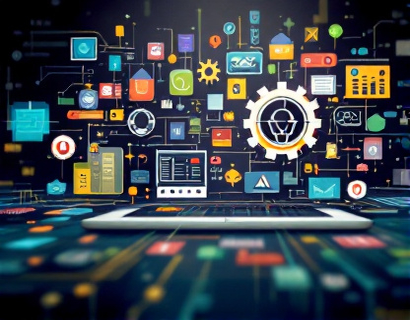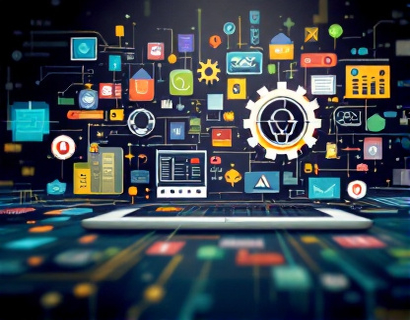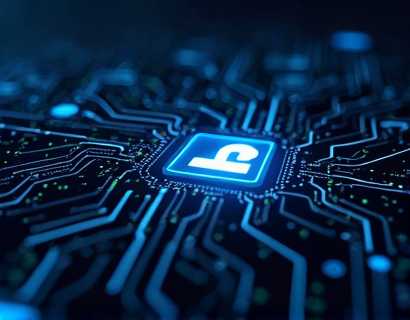Seamless AI and Blockchain Integration: An Essential Guide for Business Digital Transformation
The integration of Artificial Intelligence (AI) and blockchain technology represents a pivotal shift in the landscape of business operations and digital transformation. As companies strive to stay competitive in an increasingly digital world, understanding how to seamlessly integrate these two cutting-edge technologies is crucial. This guide serves as an essential resource for business leaders aiming to harness the full potential of AI and blockchain, offering actionable strategies to streamline operations, enhance security, and unlock new growth opportunities.
AI and blockchain, while revolutionary on their own, become even more powerful when combined. AI's ability to process vast amounts of data and make intelligent decisions, paired with blockchain's inherent security and transparency, creates a synergy that can transform various aspects of business. From supply chain management to financial services, the applications are vast and varied. This guide will delve into the key areas where AI and blockchain integration can drive significant value, providing insights and strategies for successful implementation.
Understanding AI and Blockchain
Before exploring the integration of AI and blockchain, it's essential to understand the fundamentals of each technology.
AI refers to the simulation of human intelligence processes by machines, particularly computer systems. These processes include learning (the acquisition of information and rules for using it), reasoning (using rules to reach approximate or definite conclusions), and self-correction. AI technologies encompass machine learning, natural language processing, and computer vision, among others.
Blockchain, on the other hand, is a decentralized digital ledger technology that records transactions across multiple computers in such a way that the registered transactions cannot be altered retroactively. This technology ensures transparency, security, and immutability, making it ideal for applications requiring trust and traceability.
The combination of AI and blockchain leverages the strengths of both technologies. AI can analyze and derive insights from the vast amounts of data stored on a blockchain, while blockchain can provide a secure and transparent environment for AI models to operate, ensuring data integrity and reducing the risk of fraud.
Streamlining Operations with AI and Blockchain
One of the most significant benefits of integrating AI and blockchain is the streamlining of business operations. Here are some key areas where this integration can make a substantial impact:
- Automated Processes: AI can automate routine and repetitive tasks, reducing the need for manual intervention. When combined with blockchain, these processes become more secure and transparent. For instance, in supply chain management, AI can predict demand and optimize inventory levels, while blockchain ensures that all transactions and movements are recorded and verifiable.
- Smart Contracts: Blockchain's smart contracts can be enhanced with AI to execute more complex and dynamic agreements. AI can analyze conditions and outcomes, making smart contracts more intelligent and adaptive. This is particularly useful in industries like finance and real estate, where contracts often involve multiple parties and complex conditions.
- Predictive Maintenance: In manufacturing and logistics, AI can predict equipment failures before they occur, reducing downtime and maintenance costs. Blockchain can provide a secure and transparent record of maintenance history and parts provenance, ensuring trust and reliability in the maintenance process.
By automating processes, enhancing contract execution, and improving maintenance, businesses can achieve higher efficiency and lower operational costs. The integration of AI and blockchain not only optimizes existing workflows but also opens up new possibilities for innovation and growth.
Enhancing Security through AI and Blockchain
Security is a paramount concern for businesses, especially as digital threats become more sophisticated. The combination of AI and blockchain offers robust solutions to enhance security in various ways:
Firstly, blockchain's decentralized and immutable nature makes it inherently secure against tampering and fraud. Each transaction is recorded in a block that is linked to the previous block, forming a chain that is extremely difficult to alter. This ensures the integrity and authenticity of data.
AI complements blockchain by providing advanced threat detection and response capabilities. Machine learning algorithms can analyze patterns and identify anomalies in real-time, detecting potential security breaches before they occur. For example, in cybersecurity, AI can monitor network traffic and system logs to spot unusual activities, while blockchain can ensure that all security-related transactions and updates are recorded and verifiable.
Additionally, AI can enhance the security of blockchain networks themselves. By analyzing network behavior and identifying potential vulnerabilities, AI can help in implementing more secure protocols and improving the overall resilience of the blockchain infrastructure.
The synergy between AI and blockchain creates a multi-layered security approach that is both proactive and reactive, providing businesses with a strong defense against cyber threats and ensuring the protection of sensitive data.
Unlocking New Growth Opportunities
The integration of AI and blockchain is not just about improving existing processes; it also opens up new avenues for growth and innovation. Here are some areas where businesses can leverage this integration to drive new opportunities:
Firstly, in the realm of finance, AI and blockchain can revolutionize payment systems and financial services. AI can analyze market trends and customer behavior to offer personalized financial products, while blockchain ensures secure and transparent transactions. This combination can lead to the development of new financial instruments and services, such as decentralized finance (DeFi) platforms and smart asset management systems.
Secondly, in the healthcare sector, AI can analyze medical data to provide insights for diagnosis and treatment, while blockchain can ensure the secure and privacy-preserving sharing of patient data among healthcare providers. This integration can lead to more accurate diagnoses, personalized treatments, and improved patient outcomes.
Thirdly, in the supply chain industry, AI and blockchain can create transparent and efficient end-to-end tracking systems. AI can optimize logistics and inventory management, while blockchain ensures that every step of the supply chain is recorded and verifiable. This not only enhances efficiency but also builds trust among stakeholders, leading to stronger business relationships and new market opportunities.
By embracing the integration of AI and blockchain, businesses can not only improve their current operations but also pioneer new products and services that can set them apart in the market. This forward-thinking approach is essential for staying competitive in the digital age.
Challenges and Considerations
While the benefits of integrating AI and blockchain are clear, businesses must also be aware of the challenges and considerations involved:
Firstly, the technical complexity of integrating these technologies requires a skilled workforce. Companies need to invest in training and hiring professionals who understand both AI and blockchain. Additionally, the development and maintenance of integrated systems can be resource-intensive.
Secondly, regulatory compliance is a significant concern. As AI and blockchain are still evolving, the regulatory landscape is often unclear or in flux. Businesses must stay informed about relevant regulations and ensure that their integration strategies comply with legal requirements.
Thirdly, data privacy and security remain critical issues. While blockchain enhances security, the integration with AI involves handling large amounts of data, some of which may be sensitive. Companies must implement robust data governance practices to protect user privacy and maintain trust.
Addressing these challenges proactively can help businesses navigate the integration process smoothly and reap the full benefits of AI and blockchain integration.
Actionable Strategies for Integration
To successfully integrate AI and blockchain, businesses can follow these actionable strategies:
1. Conduct a Thorough Assessment: Evaluate your current operations and identify areas where AI and blockchain can add the most value. Consider factors such as data availability, process complexity, and potential impact on business outcomes.
2. Build a Skilled Team: Assemble a team with expertise in both AI and blockchain. This team should include data scientists, blockchain developers, and domain experts who can collaborate effectively.
3. Start Small: Begin with pilot projects to test the integration in a controlled environment. This approach allows you to identify and address issues early on, minimizing risks and costs.
4. Focus on Data Quality: Ensure that the data used for AI models is accurate, complete, and relevant. High-quality data is crucial for AI's effectiveness and for making informed decisions.
5. Leverage Existing Platforms: Utilize existing AI and blockchain platforms and tools to accelerate the integration process. This can save time and resources, allowing you to focus on customization and optimization.
6. Ensure Regulatory Compliance: Stay updated on relevant regulations and ensure that your integration strategies comply with legal requirements. Engage with legal experts to navigate the regulatory landscape effectively.
7. Foster a Culture of Innovation: Encourage a culture that embraces new technologies and continuous learning. Provide training and development opportunities to keep your team up-to-date with the latest advancements in AI and blockchain.
By following these strategies, businesses can pave the way for a successful AI and blockchain integration, driving digital transformation and unlocking new growth opportunities.
In conclusion, the integration of AI and blockchain represents a powerful combination that can transform businesses across various industries. By streamlining operations, enhancing security, and unlocking new growth opportunities, companies that embrace this integration will be well-positioned to thrive in the digital age. This guide has provided actionable insights and strategies to help business leaders navigate the integration process effectively, setting the stage for a successful digital transformation journey.










































